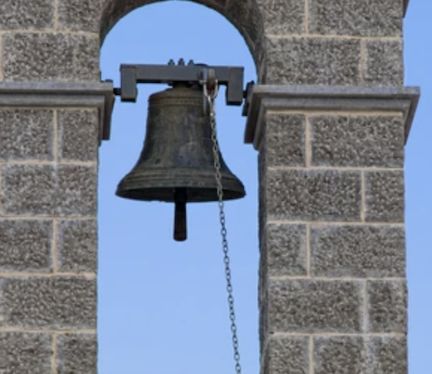The Legacy of Forgiveness
Chrisitan author and writer for such publications as Our Daily Bread writes:
Five years after World War II ended, Marvin Maris met Taizo Fujishiro at a seminary in Chicago. Although the two had once been on opposing sides during the war, Maris remained a friend to Fujishiro. He prepared class notes for him, taught him how to drive, and invited him to celebrate Christmas together. After Taizo returned to Japan, they continued to stay in touch.
Forty years later, Maris’s granddaughter, Connie Wieck, went to Japan to teach English. She called Fujishiro and introduced herself. The next day they met for lunch. Taizo told her all about her grandfather, his first American friend.
Later Connie wrote: “Having grown up in a town where many veterans still carried deep pain … I never believed forgiveness could happen between people who were directly involved in such a dark history. Yet the friendship between my grandfather and Taizo proved otherwise.”

The apostle Paul described the miracle of salvation by writing, “When we were God’s enemies, we were reconciled to Him through the death of His Son” (Romans 5:10). And John reminds us that those who have been forgiven must love their brothers and sisters (1 John 2:9-12).
The legacy of God’s forgiveness will be passed on from generation to generation if we humbly receive His gift of forgiveness in Christ and extend it to others.
Cochineal Beetles: Painting the Town Red
Among the ancient Aztecs, red dye was collected as a yearly religious tribute. Acquiring this bright colorant required hundreds of subjects to comb the desert in search of its source-the tiny female cochineal beetle. Making just a pound of this rare extract required the harvesting of about 70,000 of these insects!
After the arrival of Cortez in the1500s, Spaniards traded for the dried remains of the cochineal beetle, whose red dye created a brilliant color that no one could duplicate by any other source. Soon after, Europeans used it for coloring fabrics. In the years that followed, Michelangelo used it in paintings and the British and Canadians for their red coats.

Today, less expensive synthetic dyes have mostly replaced this insect dye, but it is still used as a natural FDA-approved coloring for food, drugs, and cosmetics. Strange as it may sound, some brands of fruit juice use this beetle as colorant. It's also fascinating to note that Spanish traders never told the Europeans of the dyes origin. And because the little beetles looked so much like seeds, they were traded as grain.
While the dye from this little beetle is used in myriad applications, just be sure that you only let it come in contact with that which you desired dyed a deep crimson red, because there's not much hope that you'll ever get the stain out should you inadvertently spill or apply it!
That said, did you know that the Bible teaches you CAN wash red stains ... with blood no less! ... and get pure white? "Come now, and let us reason together, says the LORD, 'Though your sins are like scarlet, they shall be as white as snow; though they are red like crimson, shall be as wool'" (saiah 1: 18).
"These are the ones who come out of the great tribulation, and washed their robes and made them white in the blood of the Lamb" (Revelation 7:14).
Put Down the Rope
Most of us are familiar with a bell tower. In order to ring the bell, a rope has to be pulled. For the bell to stop ringing, we must let go of the rope.

Corrie ten Boon, best known for hiding Jews during the Holocaust, was later captured and sentenced to hard labor in various concentration camps. She alone, from her family, survied to tell her story. Time and again she was confronted with her need to forgive those who had so brutually tortured her and her family.
Years later, after hearing a sermon on forgiveness, she often used the imagery of a bell in the tower to recount her own struggle with "letting go."
“'Up in that church tower,' [the pastor] said, nodding out the window, 'is a bell which is rung by pulling on a rope. But you know what? After the sexton lets go of the rope, the bell keeps on swinging. First ding then dong. Slower and slower until there’s a final dong and it stops.'
“I believe the same thing is true of forgiveness. When we forgive someone, we take our hand off the rope. But if we’ve been tugging at our grievances for a long time, we mustn’t be surprised if the old angry thoughts keep coming for a while. They’re just the ding-dongs of the old bell slowing down.” — Corrie Ten Boom, Guideposts Classics, November 1972)
When we choose to forgive, it means we're finally willing to let go of the rope. The ringing may continue, but over the course of time, it will eventually stop, as long as we make the choice to not pick up the rope again.
That said, what area(s) in your life are bringing you to the verge of exhaustion from continuing to ring the bell?
In what situations is God asking you to put down the rope? When are you tempted to pick up the rope again?
As you face your own battle with forgiveness, ask the Lord, as the Apostles did, to increase your faith!
"So watch yourselves. “If your brother or sister sins against you, rebuke them; and if they repent, forgive them. Even if they sin against you seven times in a day and seven times come back to you saying ‘I repent,’ you must forgive them. The apostles said to the Lord, 'Increase our faith!'” (Luke 17:3-4, NIV).
"Bear with each other and forgive one another if any of you has a grievance against someone. Forgive as the Lord forgave you" (Colossians 3:13, NIV).